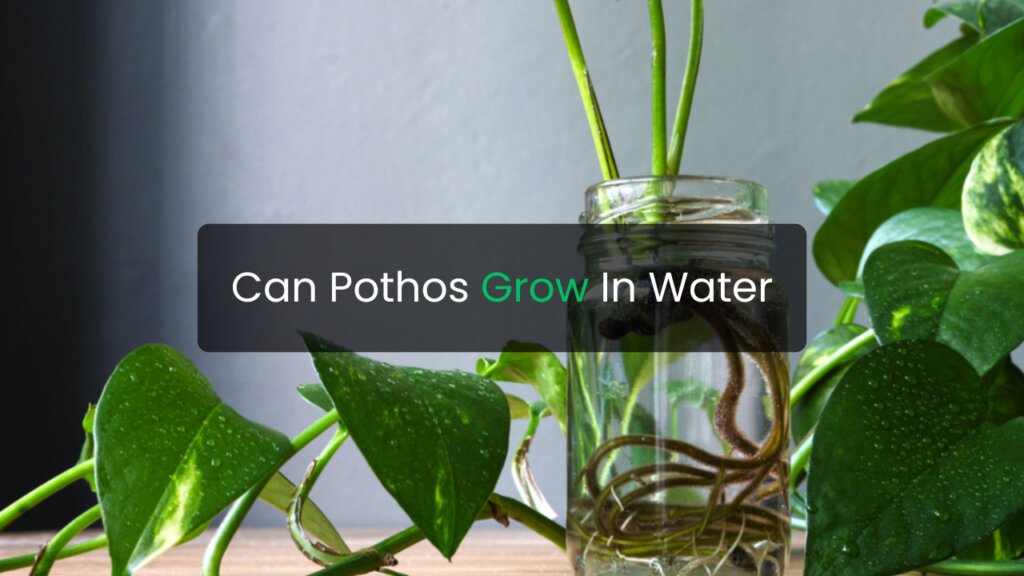Yes, pothos can grow in water for a long time and remain healthy with the right care. This plant is known for its adaptability, making it one of the easiest houseplants to grow without soil. Many plant lovers choose to grow pothos in water because it’s low-maintenance, attractive, and perfect for indoor spaces.
When grown in water, pothos develops roots that adjust to the aquatic environment. As long as you keep the water clean and provide essential nutrients, your pothos can thrive beautifully without needing to be planted in soil.
How to Grow Pothos in Water
1. Choose a Healthy Cutting
Select a healthy vine from a mature pothos plant. Cut below a node (the small bump where leaves grow) because roots emerge from these points. Each cutting should have at least two to three leaves for better growth.
2. Place the Cutting in Water
Use a clean glass jar or vase and fill it with filtered or distilled water. Tap water can be used if it’s left out for 24 hours to allow chlorine to evaporate. Place the cutting so the nodes are submerged but the leaves stay above water.
3. Provide Bright, Indirect Light
Pothos prefer bright, indirect sunlight. Avoid direct sunlight as it can cause leaf burn. A spot near a window with filtered light is ideal.
4. Change the Water Regularly
To keep your pothos healthy, replace the water every 1 to 2 weeks. This prevents algae buildup and ensures the roots get enough oxygen.
5. Add Liquid Fertilizer Occasionally
Water alone doesn’t provide enough nutrients for long-term growth. Add a few drops of a balanced liquid fertilizer once a month to support healthy root and leaf development.
Benefits of Growing Pothos in Water
- Low Maintenance: No need to worry about soil, pests, or overwatering.
- Aesthetic Appeal: The glass container allows you to see the roots, adding a modern and clean touch to your home decor.
- Space-Saving: Perfect for small apartments, offices, or shelves.
- Cleaner Air: Like soil-grown pothos, water-grown ones also help purify indoor air.
Common Problems and Solutions
1. Yellow Leaves:
This can happen due to too much direct sunlight or stagnant water. Move the plant to a shaded spot and change the water frequently.
2. Algae Growth:
If the container is clear, algae may form due to light exposure. Clean the jar and replace the water regularly to keep it clear.
3. Slow Growth:
Lack of nutrients might be the cause. Add a small amount of liquid fertilizer to encourage new leaves and stronger roots.
How Long Can Pothos Live in Water?
Pothos can live indefinitely in water with proper care. Some people have grown water-only pothos for several years without transferring them to soil. The key is consistent maintenance—clean water, light, and occasional feeding.
Tips for Healthy Water-Grown Pothos
- Use a container with a narrow neck to support the stems.
- Avoid copper containers, as copper can be toxic to plants.
- Rinse the roots occasionally to prevent slime buildup.
- Keep the water level consistent to cover the nodes.
FAQs
Can pothos live in water forever?
Yes, pothos can live in water for many years as long as they receive clean water and nutrients regularly.
How often should I change the water for pothos?
It’s best to change the water every 1 to 2 weeks to keep it fresh and oxygen-rich.
What kind of water is best for growing pothos?
Filtered, rain, or distilled water is best. If using tap water, let it sit for 24 hours before use.
Can I transfer water-grown pothos to soil later?
Yes, you can easily transfer them. Once the roots are a few inches long, plant the cuttings in well-draining soil.
Do pothos grown in water need fertilizer?
Yes, add a few drops of liquid fertilizer once a month to provide essential nutrients for healthy growth.
Final Thoughts
Growing pothos in water is a simple and rewarding way to enjoy this popular indoor plant. With regular care and clean water, you can have a lush, green pothos that brings beauty and freshness to your home. Whether you keep it in a glass vase on your desk or hang it near a window, your water-grown pothos will thrive and stay healthy for years.





